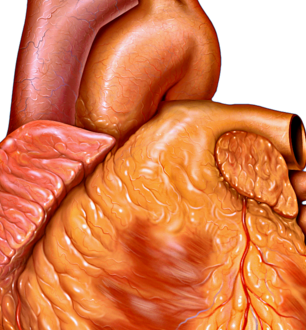Heart diseases have become a leading cause of morbidity and mortality in Ghana.
According to the Director-General of Ghana Health Service, more than 600,000 people, including 400,000females and 200,000 men are diagnosed with high blood pressure every year, with many more affected people remaining undiagnosed.
Heart disease is a general term that includes many types of heart problems affecting anyone, including children.
Because it affects such a large percentage of the population, it’s important that everyone knows facts about heart disease and signs and symptoms to look out for.
There are many different types of heart disease with various causes that range from genetic factors to lifestyle choices or health events that can affect the heart, such as damage from infection. Some pre-existing conditions in the body may put an individual more at risk for developing heart disease, such as age, high blood pressure (hypertension), high cholesterol and diabetes, overweight or obesity, lack of exercise, family history.
Globally heart diseases are attributed to hypertension, diabetes, physical inactivity and overweight and obesity. No matter the cause, it’s a good idea to be aware of signs and symptoms of the different types of heart disease so that any potential problems can be caught early and treated appropriately. Here are a few of the most common types of heart disease.
Coronary artery disease
Coronary artery disease affects the blood vessels of the heart. Like the pipes in our homes, the arteries around the heart can develop a build-up of plaque that narrow the passage. This narrowing can sometimes cause a complete blockage resulting in poor blood flow to certain parts of the heart, which can lead to a heart attack.
While coronary artery disease is often discovered after a person has suffered a heart attack, we should be aware of signs of coronary artery disease that can help lead to early diagnosis and treatment, as well as prevention.
Signs and symptoms of coronary artery disease include:
Chest pain, tightness, pressure or discomfort (also known as angina)
Shortness of breath
Nausea (typically specific to women)
Extreme fatigue (typically specific to women)
Arrhythmias
Arrhythmias are heart problems related to the speed and rhythm of the heartbeat.
Arrhythmias can cause the heartbeat to be too slow, too fast or irregular. If the rhythm of the heart is ‘off’, it can prevent the heart from having enough force to send the blood out to the rest of the body. When the heart beats faster than normal, it is called tachycardia.
When the heart beats too slowly, it is called bradycardia. The most common type of arrhythmia is atrial fibrillation, which causes an irregular and fast heartbeat.
Signs and symptoms of arrhythmias include:
Fluttering in the chest
Racing heartbeat (tachycardia)
Slow heartbeat (bradycardia)
Chest pain or discomfort
Shortness of breath
Fainting(syncope) or near fainting
Lightheadedness
Congenital heart defects (CHDs)
Congenital heart defects (CHDs) are problems with the structure of the heart.
Congenital means that that the problems are present at birth. These defects happen when a baby’s heart doesn’t develop normally during pregnancy. Congenital heart defects can change the way the heart pumps blood. They may make blood flow too slowly, go the wrong way, or block it completely.
Congenital heart defect symptoms include:
Pale gray or blue skin or lips
Swelling in the legs, belly area or areas around the eyes
In an infant, shortness of breath during feedings, leading to poor weight gain
Heart failure
Heart failure is a condition in which your heart can’t pump enough blood to meet your body’s needs. Heart failure doesn’t mean that your heart has stopped or is about to stop beating. Usually, this is because your heart muscle is too weak to “squeeze” out enough blood with each beat, your organs may not work well, which can cause serious problems.
Heart failure can happen at any age, but it can be found most often in older people. It’s a serious condition — and also quite common. Many people with heart failure continue to have a full and active life for many years after their diagnosis.
Symptoms of heart failure vary based on the type of heart failure you have.
Common symptoms include:
Shortness of breath
Cough
Feeling very tired and weak
Weight gain (from fluid buildup)
Swollen ankles, feet, belly, lower back, and fingers
Puffiness or swelling around the eyes
Trouble concentrating or remembering
Heart valve disease
The heart has four valves that help it pump efficiently- the tricuspid, pulmonary, mitral, and aortic valves. The valves have flaps that open and close to move blood through the heart to the rest of your body. When your heart beats, the flaps open to let blood through. Between heartbeats they close to stop the blood from flowing backwards When the valves or heart tissues aren’t working properly, the blood isn’t able to flow through the heart and out to the rest of the body. For example, blood can become ‘stuck’ in the chambers of the heart and begin to clot, which puts a person at risk for a stroke.
Signs and symptoms of heart valve and structural heart disease include
Fatigue
Shortness of breath, especially with activity or when laying down
Irregular heartbeat
Swollen feet or ankles
Fainting
Abnormal sound (heart murmur) when heard with a stethoscope
Note: No matter the symptoms or signs, if you suspect that you may be experiencing any of the above, it’s a good idea to get seen quickly by a medical professional for diagnosis and treatment.
Source: Samuel Abunkunyi
 Home Of Ghana News Ghana News, Entertainment And More
Home Of Ghana News Ghana News, Entertainment And More





